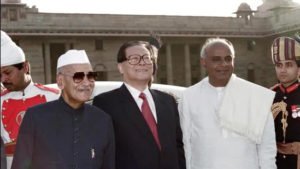![]()
Beijing: Former Chinese leader Jiang Zemin, who led China after the Tiananmen massacre in 1989 and was the first Chinese head of state to visit India in 1996, passed away in Shanghai on Wednesday, Chinese state media announced. He was 96.
“Our beloved comrade Jiang Zemin died at 12:13 on November 30, 2022 in Shanghai at the age of 96 due to leukaemia and multiple organ failure,” the Communist Party of China (CPC) central committee said in a written statement addressed to all the party organs and published by state media on Wednesday.
Jiang served as CPC general-secretary from 1989 to 2002; chairman of the powerful Central Military Commission – which oversees the People’s Liberation Army (PLA) — from 1989 to 2004; and president between 1993 and 2003.
“Comrade Jiang Zemin’s death is an incalculable loss to our Party and our military and our people of all ethnic groups,” the statement said, saying the announcement was made with “profound grief”.
“It described ‘our beloved Comrade Jiang Zemin’ as an outstanding leader of high prestige, a great Marxist, statesman, military strategist and diplomat and a long-tested communist fighter, a Reuters report said.
Jiang was from relative obscurity plucked by the CPC leadership to head China’s ruling party after the bloody Tiananmen crackdown on pro-democracy protesters in 1989, reports said.
Jiang credited with bringing China back into the diplomatic mainstream after the international isolation which followed the Tiananmen massacre.
“Jiang Zemin presided over a golden time for economic reforms as well. Socialist Market Economy, Three Represents, WTO. Some argue that this was in response to Tiananmen, but I think Jiang and (Chinese leader) Zhu Rongji were simply driven by their belief that China can do better for its people,” Bert Hoffman, director of the East Asian Institute of the National University of Singapore said in a post on Twitter.
Jiang, in 1996, became the first Chinese head of state to visit India since the CPC came to power in China in 1949. His visit was seen as a big step towards normalising Sino-India bilateral ties. It was during his visit that the two countries reached a consensus on building a “constructive and cooperative partnership for the 21st century”.
The Chinese leader and then Indian Prime Minister HD Deve Gowda signed a set of “confidence building measures” (CBM) which included the article “not to attack each other” or cross the Line of Actual Control (LAC), the de facto border between the two countries.
During his visit, Jiang also met his Indian counterpart at the time, president Shankar Dayal Sharma, and discussed reduction of border troops.
Jiang was accorded a ceremonial welcome with a 21-gun salute and a 12-minute welcoming ceremony.
In 2003, he met then Indian Prime Minister Atal Bihari Vajpayee, who was on a visit to China, in his capacity as the chairman of the Central Military Commission.
According to an official statement on the meeting between the two leaders, Jiang said that he hoped the two sides would continue to settle existing issues through consultation on an equal footing, mutual understanding and accommodation.
He expressed his confidence about the future of China-India relations,” the statement said.
Jiang, who was a prolific reader, quoted Indian poet and Nobel Laureate Rabindranath Tagore to Vajpayee, saying, “He has made his weapons his gods. When his weapons win he is defeated himself”.
Jiang said China opposed the abuse of force in international relations, and supported all efforts that were conducive to maintaining international and regional peace.
“In a 2000 interview, CBS journalist Mike Wallace called Jiang ‘a dictator, an authoritarian’”, to which Jiang objected, according to the NPR news website.
The Chinese leader told Wallace in English that he did not agree with his “point”.
“Your way of describing what things are like in China is as absurd as what the Arabian Nights may sound like,” Jiang said.






